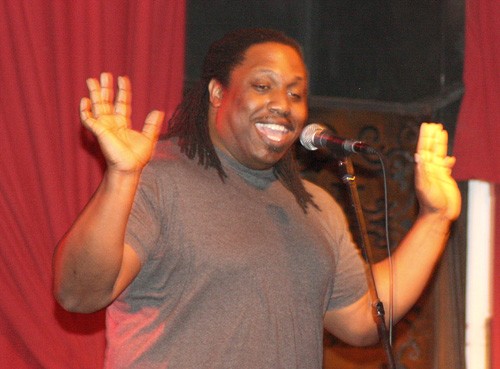It’s hard to describe the organization of a poetry slam. The poets form a republic, each voice equal in the chambers, while the audience is the bastard child of a hostile mob, a squad of transgendered cheerleaders. It’s a paradoxical world of anarcho-fascism. The entire assembly caroms between the unstable heights of each poet’s persona, driven by the sort of howling maw you would expect at a football game instead of a poetry reading.
It’s damn cool.
Club Congress hosted the 28th annual Tucson Poetry Festival on Friday and Saturday night, which culminated in the 2010 Tucson Poetry Festival Grand Slam.
The thought of listening to poetry for an entire night sends me running in the opposite direction. However, a poetry slam is nothing like the methodical and abstract musings of a typical reading. Unless, of course, your idea of a typical reading has nine poets competing for $1,000, with the winner describing his mother’s labia as made out of razorblades in an open letter to the people of Darfur.
And no, that is not taken out of context.
A poetry slam is like the Super Bowl for the inner artist. Fans show up, order a lot of drinks — seriously, a lot, the guy next to me was drinking straight rye all night — and cheer raucously for their favorite poet. A few unfortunate saps volunteer to be judges for the night, essentially making themselves the target of profanity-laced tirades every time they score a poet too low.
Scorsese pales in comparison to the vitriolic contempt brought forth from the mouths of a poet scorned.
Last weekend was no different. Hosting the slam was Tucson’s own Lindsay Miller. One of the co-founders of Ocotillo Poetry Slam — Tucson’s only Poetry Slam, Inc. certified slam — Miller is a dynamic host and tremendous voice for the community. Her booming cries and authoritative presence owned the room every time she stepped on stage demanding applause for the poets, but never the scores. Miller’s commanding personality was matched only by her genuine respect for the poets performing.
Despite its brash exterior, the slam community is very much a family. Several of the competing poets are regulars at Ocotillo’s slams on the fourth Saturday of each month and, between performances, sat with one another as though they were old friends instead of competitors. Mutual respect is hard to come by in any field, so the amount of authentic graciousness toward fellow artists was astonishing.
I overheard one of the poets who did not advance to the final round whispering accolades to her friend about one of the competitors who had gone on in the competition. Her words were neither bitter nor jealous; they were the call of absolute reverence.
The slam winner, Ed Mabrey, appeared upon first glance to be the outsider. Originally from Columbus, Ohio, Mabrey was the 2007-08 Individual World Poetry Slam Champion and is the Slammaster of Phoenix’s Black Pearl Poetry collective. However, after winning the slam, Mabrey performed a heartfelt slam about his time on the road. Included in the poem were shout-outs to guest poet Sonya Renee and Tucson’s own Doc Luben — both in attendance.
Mabrey is someone you need to pay attention to. He can infuse anger with passion and incite love with his rage. His poetry merges world suffering with deeply personal anecdotes to resonate as both universal and individual. Before each slam, Mabrey stood a few feet behind the microphone, rubbing his fingers across his knuckles and staring at the ground. It was a nervous routine, like a basketball player spinning the ball in his hands before a free throw.
But when Mabrey opened his mouth, his nerves gave way to a frothy force that moved me to a state of immobility. Everyone experiences absolute awe at some point in his or her life — I did the moment Mabrey’s words painted the image of black children playing stickball with the remnants of a church bomb’s shrapnel. His words weren’t hostile, but they knew absolute agony and sure as hell weren’t ashamed of it.
Poetry can be off-putting in so many ways. There is so much subjectivity to it that it often comes off as esoteric ramblings. This is an understandable hurdle, one that I sympathize with. However, to live in Tucson and dismiss the local Slam community would be a terrible mistake. They are an exhilarating and unforgettable family. They are angry and full of hot emotions. They don’t fit into easy classifications.
And thank God for that.









